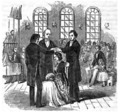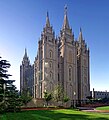Portal:Latter Day Saint movement
|
Welcome to the portal of The Latter Day Saint movement
Introduction The Latter Day Saint movement (also called the LDS movement, LDS restorationist movement, or Smith–Rigdon movement) is the collection of independent church groups that trace their origins to a Christian Restorationist movement founded by Joseph Smith in the late 1820s. Collectively, these churches have over 17 million nominal members, including over 17 million belonging to the Church of Jesus Christ of Latter-day Saints (LDS Church), 250,000 in Community of Christ, and several other denominations with memberships generally ranging in the thousands of members. The predominant theology of the churches in the movement is Mormonism, which sees itself as restoring again on Earth the early Christian church; their members are most commonly known as Mormons. An additional doctrine of the church allows for prophets to receive and publish modern-day revelations. A minority of Latter Day Saint adherents, such as members of Community of Christ, have been influenced by Protestant theologies while maintaining certain distinctive beliefs and practices including continuing revelation, an open canon of scripture and building temples. Other groups include the Remnant Church of Jesus Christ of Latter Day Saints, which supports lineal succession of leadership from Smith's descendants, and the more controversial Fundamentalist Church of Jesus Christ of Latter-Day Saints, which defends the practice of polygamy. One source estimated over 400 denominations have sprung from founder Joseph Smith's original movement. (Full article...) General images -The following are images from various Latter Day Saint movement-related articles on Wikipedia.
Selected article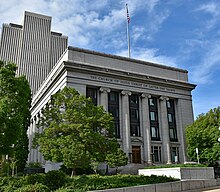 The Church Administration Building (CAB) is an administrative office building in Salt Lake City, Utah, United States, serving as the headquarters of the Church of Jesus Christ of Latter-day Saints (LDS Church), the fourth-largest Christian denomination in the United States. Completed in 1917, the building is adjacent to Temple Square, between the Joseph Smith Memorial Building and the Lion House, on South Temple Drive. It differs from the Church Office Building (COB) in that it is much smaller and furnishes offices for the First Presidency and the Quorum of the Twelve Apostles. It also houses offices for other general authorities and their staff. Only church officials and their guests are permitted to enter. The CAB has been used for meetings between church leaders and political and community leaders. (Full article...) Selected locationVoree (/vɔːriː/) is an unincorporated community in the Town of Spring Prairie in Walworth County, Wisconsin, United States. It is best known as the headquarters of the Church of Jesus Christ of Latter Day Saints (Strangite), a denomination of the Latter Day Saint movement. According to James Strang, founder of the Strangite church and of the town, the name means "Garden of Peace". The community is situated along former Wisconsin Highway 11, just west of the Racine County line. (Full article...)
Selected schismatic historiesThe Church of Jesus Christ of Latter Day Saints—usually distinguished with a parenthetical (Strangite)—is one of the several organizations that claim to be the legitimate continuation of the church founded by Joseph Smith on April 6, 1830. It is a separate organization from the considerably larger and better known Utah-based Church of Jesus Christ of Latter-day Saints (LDS Church). Both churches claim to be the original organization established by Smith. The Strangite church is headquartered in Voree, Wisconsin, just outside Burlington, and accepts the claims of James Strang as successor to Smith. It had approximately 300 members in 1998. An undated FAQ on the church's official website reports there are around 130 active members throughout the United States. After Smith was murdered in 1844 with no clear successor, several claimants sought to take leadership of the church which Smith founded. Among them was Strang, who competed with other prominent members, notably Brigham Young and Sidney Rigdon. (Full article...) OutlinesRelated portalsKey biographiesJohn Alpheus Cutler (February 29, 1784 – June 10, 1864) was an early leader in the Latter Day Saint movement who founded the Church of Jesus Christ (Cutlerite) in 1853. He had previously served in several church positions under Joseph Smith, founder of the Latter Day Saint movement, as well as captain of Smith's personal bodyguard and "Master Builder and Workman on all God's Holy Houses." Following the death of Joseph Smith in June 1844, Cutler at first followed the Twelve Apostles under Brigham Young, but later left Young's church to reorganize the Church of Jesus Christ, with himself serving as its first president. Cutler claimed that this was the sole legitimate continuation of Smith's organization, and he served as its leader until his death. (Full article...)
Selected image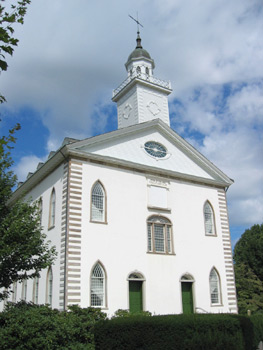 The Kirtland Temple, dedicated on March 27, 1836, making it the first temple to be built by adherents of the Latter Day Saint movement. Currently owned and operated by the Community of Christ.
Did you know (auto generated)
Selected Anniversaries
Selected quote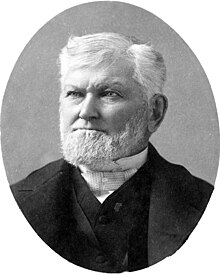
TopicsFeatured contentCategoriesWikiProjectsAssociated WikimediaThe following Wikimedia Foundation sister projects provide more on this subject:
Discover Wikipedia using portals | ||||||||||




